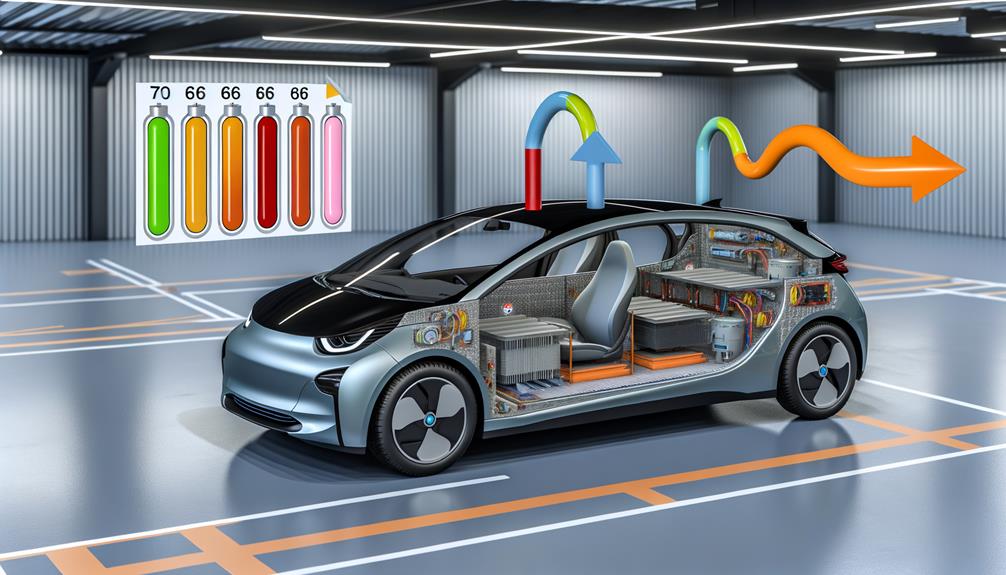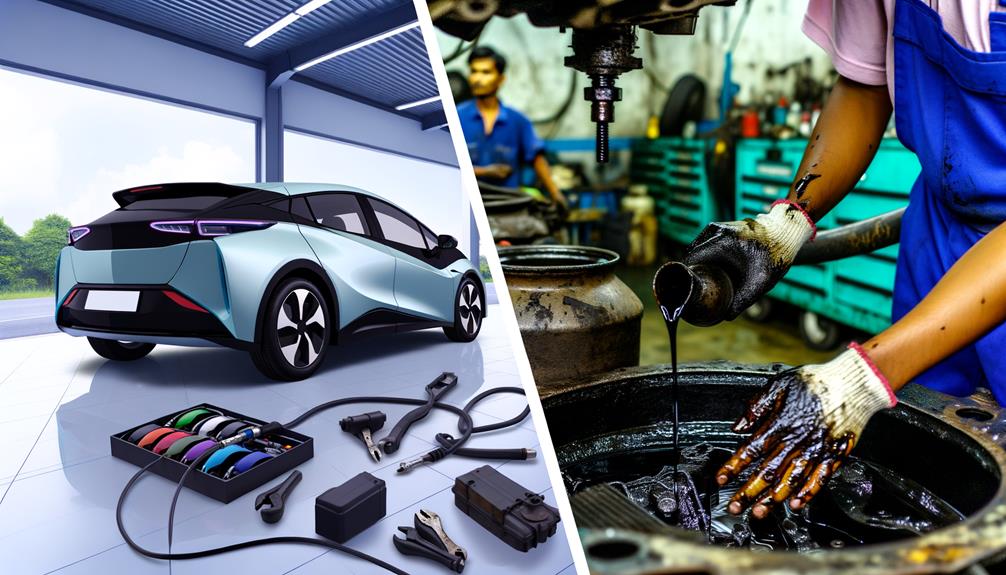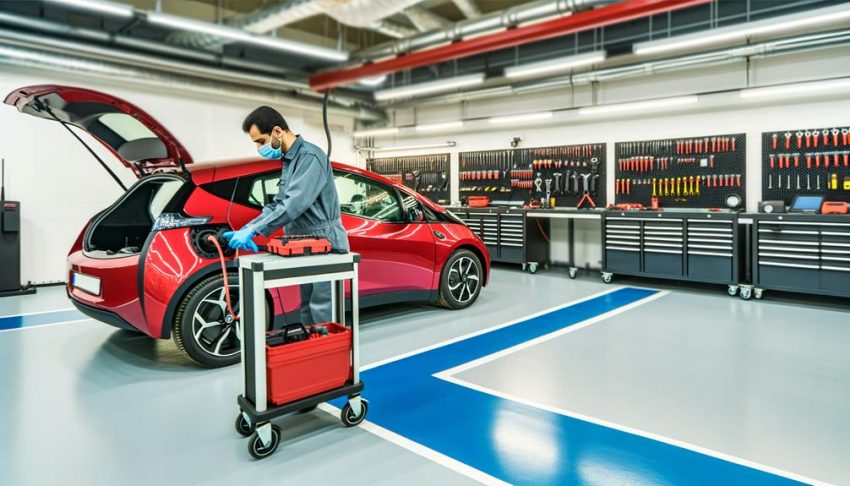When you think about maintaining an electric car, it's easy to assume there's not much to it since there's no engine oil to change or exhaust system to worry about. However, keeping your electric vehicle in top shape involves some unique tasks, like regular inspections of tire pressure and battery coolant levels. Did you know that proper charging practices and maintaining the battery temperature can greatly extend its lifespan? And what about those software updates and occasional professional services—how essential are they really for efficiency and warranty coverage? Let's explore these aspects to guarantee your electric car stays reliable and efficient.
Contents
Battery Maintenance
How can you guarantee your electric vehicle's (EV) battery remains in top condition? Effective battery maintenance is vital for making sure the longevity and performance of EV batteries. Typically, EV batteries have a lifespan of 8-15 years, but this can be influenced by climate conditions and usage patterns. Regular monitoring is essential for peak performance.
To maximize battery life, it's important to maintain the battery within recommended temperature ranges. Extreme temperatures can degrade battery efficiency, so your EV should ideally be kept in a garage or shaded area to mitigate the impacts of harsh weather. Battery coolant levels should be checked regularly, as proper coolant levels help in maintaining the battery within its best temperature range, enhancing both performance and lifespan.
In addition to physical maintenance, staying current with software updates from your vehicle's manufacturer is equally important. Software updates often include improvements in battery management systems that can enhance charging practices and overall battery performance. This guarantees the battery management system operates under ideal conditions, further extending the battery's lifespan.
Manufacturers generally offer warranties on EV batteries, covering them for about 8 years or up to 100,000 miles, with some extending to 150,000 miles. Despite this, proactive maintenance is key. By adhering to recommended charging practices (keeping the charge between 20% and 90%) and regular checks on battery coolant levels, you can greatly extend the life of your EV battery. Proper battery maintenance not only safeguards your investment but also makes sure your EV operates efficiently under various climate conditions.
Charging Practices
Maintaining ideal charging practices is vital for extending your electric vehicle's battery life and guaranteeing efficient performance. To mitigate battery degradation, aim to keep your daily charging level between 85-90%. Avoid fully charging or completely depleting the battery, as these extremes can accelerate wear and reduce longevity.
Adhering to an ideal charging range of 20% to 80% is essential. This range not only helps in prolonging battery life but also enhances overall vehicle performance. Many manufacturers have implemented charging limits that prevent overcharging by capping the charge below 100%, further protecting your battery's health.
Fast chargers, while convenient for long trips, should be used sparingly. Frequent reliance on fast chargers can degrade battery packs more rapidly compared to slower, regular chargers. Reserve fast charging for when it's truly necessary, and opt for slower charging methods during daily use to maintain the integrity of your battery.
Charging your electric vehicle at home is considerably more cost-effective, typically being 3-4 times cheaper per kWh than using a fast charger. This makes home charging an excellent choice for daily charging, promoting efficient energy use and reducing overall costs.
Overcharging is another important factor to avoid. Even though manufacturers have set charging limits to prevent this, it's wise to monitor your charging practices actively. By maintaining these recommended charging practices and paying attention to daily energy use, you can guarantee your electric vehicle's battery remains in ideal condition, maximizing its life and performance. Remember, consistent and careful charging habits are key to the longevity and efficiency of your electric car.
Temperature Management

Proper temperature management is essential for maintaining the efficiency and longevity of your electric vehicle's battery. Extreme temperatures, both hot and cold, can greatly affect battery performance, leading to a reduction in range and an accelerated degradation process. As a result, it is important to guarantee that your EV's battery remains within ideal temperature conditions.
Manufacturers have equipped EVs with sophisticated cooling systems and heating systems to regulate battery temperature. These systems work to keep the battery within a specific temperature range, crucial for preserving battery longevity and maintaining consistent performance. For instance, the cooling system prevents overheating during high-demand driving or hot weather, while the heating systems make sure the battery remains functional in colder climates.
To effectively manage temperature, regularly monitor battery temperature using your vehicle's onboard diagnostics or mobile app. This practice will help you stay informed about the current state of your battery and enable you to adjust your driving habits according to prevailing environmental conditions. For example, during extremely hot or cold weather, it might be wise to limit rapid acceleration or long-distance trips to prevent undue stress on the battery.
Thermal management systems play a significant role in protecting your battery from adverse environmental conditions. By maintaining ideal battery conditions, these auxiliary systems mitigate the risk of degradation and enhance overall battery longevity.
Neglecting proper temperature management can lead to a rapid decline in battery health, negatively impacting your EV's performance and range. As a result, always be proactive in monitoring and managing battery temperature, guaranteeing your electric vehicle operates efficiently under all conditions.
Routine Inspections
Routine inspections are essential to guaranteeing the longevity and ideal performance of your electric vehicle (EV). Regularly scheduled maintenance checks not only uphold your warranty coverage but also contribute considerably to the overall efficiency and safety of your vehicle. Let's explore the fundamental components of these inspections.
Monthly, you should conduct routine checks on your EV's tire pressure, wear, and washer fluid levels. Proper tire maintenance is crucial for both safety and peak performance, guaranteeing your vehicle handles well and maintains efficient energy consumption.
Every 7,000 miles, it is important to inspect the battery coolant levels, power inverters, and charger functionality. These inspections guarantee that your EV's electrical systems remain in prime condition, preventing overheating and maintaining efficient energy transfer and storage.
Moreover, brake fluid should be replaced biennially. Given the regenerative braking systems in EVs, the wear on brake pads might be less than in traditional vehicles, but the brake fluid is still critical for effective braking performance and overall safety.
Regular professional service checks are indispensable for the electrical, cooling, and braking systems. Early identification and rectification of potential issues prevent costly repairs and prolong the life of your EV.
Here's a summary table for your convenience:
| Inspection Item | Frequency | Purpose |
|---|---|---|
| Tire pressure and wear | Monthly | Safety and efficiency |
| Washer fluid levels | Monthly | Visibility and safety |
| Battery coolant levels | Every 7,000 miles | Electrical systems maintenance |
| Power inverters | Every 7,000 miles | Electrical systems performance |
| Charger functionality | Every 7,000 miles | Safe and efficient energy transfer |
| Brake fluid replacement | Every 2 years | Effective braking performance and safety |
Maintenance Cost Comparison

While regular inspections guarantee your EV's ideal performance and longevity, understanding the cost implications further highlights their value. Electric vehicles (EVs) offer a significant reduction in maintenance costs compared to traditional gas cars, primarily due to their simplified mechanics and fewer moving parts.
The maintenance costs for electric vehicles average around $900 per year, which is approximately 25% less than the $1,200 annual maintenance cost typically incurred by gas cars. This difference is attributed to several factors:
- Fewer Moving Parts: EVs have far fewer moving parts than gas cars, resulting in less wear and tear and therefore lower maintenance needs.
- Reduced Fluid Replacement: Electric vehicles don't require oil changes, transmission fluid replacements, or other fluid-related services that gas cars need.
- Lower Service Costs: Analysis of 2018 electric vehicles shows that, within the first three years of ownership, service costs were 31% lower than those for their gasoline counterparts.
- Long-Term Savings: Over the lifespan of an EV, electric car owners can save an average of $4,600 in maintenance costs compared to traditional gas vehicles.
The maintenance schedule for electric vehicles is also less frequent, further driving down long-term ownership costs. This reduction is due to the inherent design of EVs, which includes fewer systems that require regular maintenance. For instance, brake wear is minimized due to regenerative braking systems, which also contributes to lower service costs.
Frequently Asked Questions
What Maintenance Is Required for Electric Cars?
You'll need to focus on battery maintenance, tire rotation, brake inspection, and coolant system checks. Regular software updates, charging infrastructure assessments, and cabin air filter changes are essential. Keep an eye on regenerative braking, high voltage components, and warranty coverage.
Are Electric Cars Expensive to Maintain?
Electric cars aren't expensive to maintain. Cost comparison shows lower repair costs and maintenance schedules, despite higher insurance rates. Warranty coverage mitigates battery replacement expenses. Service intervals are less frequent, and charging infrastructure supports the driving range, enhancing resale value.
What Is the Lifespan of an Electric Car?
You're looking at a lifespan of 12-15 years for an electric car, influenced by battery longevity, driving range, and charging infrastructure. Technology advancements, government incentives, and user experience also impact ownership costs, resale value, and environmental impact.
Do Electric Cars Need an Oil Change?
Electric cars don't need oil changes. Instead, focus on battery care, charging habits, tire rotation, brake inspection, coolant levels, software updates, cabin filters, regenerative braking, electrical systems, and warranty coverage to guarantee peak performance and longevity.
Conclusion
In summary, maintaining your electric car involves diligent attention to battery health, charging practices, and temperature management. Regular inspections and adherence to manufacturer guidelines are essential. Keeping tire pressure, battery coolant, and brake fluid in check every 7,000 miles, along with monthly tire and washer fluid assessments, guarantees peak performance. Don't overlook software updates and professional services to uphold efficiency and warranty coverage. By following these protocols, you'll extend your vehicle's lifespan and reliability.
